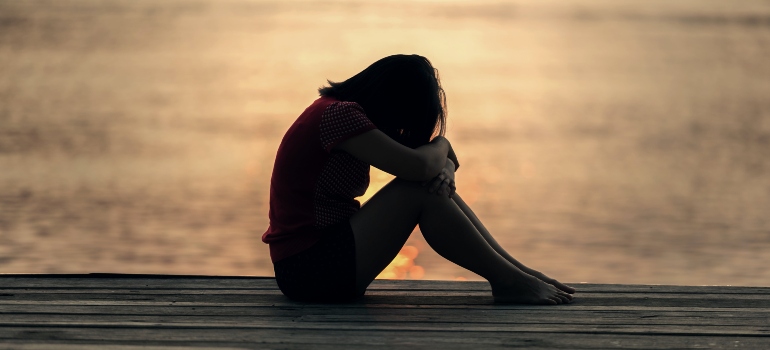There is a link between bullying and addiction in Cambridge OH. Harmony Ridge Recovery Center WV will explore why this issue arises and what it means for the community. Our goal is to bring this complex problem into the open and start a conversation that could make Cambridge a better and more caring place for everyone.
What Is Bullying?
Bullying is a behavior that involves the repeated use of power, aggression, or threat to intentionally harm or control another person. It can take various forms, including verbal, physical, or relational aggression, and can occur in person or online. Bullying typically involves an imbalance of power, where the person doing the bullying has some form of advantage over the victim. This behavior is often characterized by a pattern of repeated incidents, creating a hostile environment for the individual being targeted.

Common types of bullying include:
- Verbal Bullying: This involves using words to hurt or humiliate someone, such as name-calling, teasing, or making derogatory remarks.
- Physical Bullying: This includes any form of physical harm or aggression, such as hitting, kicking, pushing, or damaging someone’s belongings.
- Social or Relational Bullying: This form of bullying focuses on damaging someone’s social relationships or reputation. It may involve spreading rumors, excluding someone from a group, or manipulating social situations.
- Cyberbullying: With the rise of technology, bullying can also occur online. Cyberbullying involves using digital platforms to harass, threaten, or humiliate someone through messages, social media, or other online means.
Risk Groups
Bullying can happen to anyone, but some groups are more likely to be picked on. It’s important to remember that no one is immune to bullying, and just because someone has certain characteristics doesn’t mean they’ll definitely be bullied. It is complicated and has many sides. Here are some groups that might be more likely to face bullying:
- Children and Adolescents: Bullying often happens when kids are growing up. Children who seem different or have trouble with friends might be targets.
- LGBTQ+ Youth: Kids who identify as lesbian, gay, bisexual, transgender, or questioning may be at a higher risk because of unfair judgments, stereotypes, or discrimination.
- People with Disabilities: Those who have physical, intellectual, or developmental disabilities might be picked on because they’re different.
- New Kids or Workers: If you’re new to a school or job, people might pick on you because you’re not familiar with everything, or they might see you as an outsider.
- Minority and Immigrant Groups: People from minority or immigrant communities might experience bullying based on their culture, language, or how they look.
The Impact of Bullying on Mental Health
Dealing with the effects of bullying on mental health is important because it can seriously harm a person’s well-being. When someone goes through bullying, it’s not just a short-lived problem—it can deeply affect their mental and emotional state. It is important to understand that the hurt from bullying isn’t just on the outside; it gets deep into a person’s mind, affecting how they see themselves, how confident they feel, and their overall mental health.

For those who have been bullied, the emotional toll can lead to anxiety, depression, and a heightened vulnerability to stress. The constant fear of being targeted, coupled with the emotional distress caused by the actual acts of bullying, can create a toxic cycle. On top of that, people who’ve been bullied might find it tough to trust others, making it hard for them to build good relationships and handle social situations.
The Connection Between Bullying and Substance Abuse in Cambridge OH
Victims of bullying often feel down, anxious, and stressed out. Some people, to cope with all those overwhelming feelings, might turn to substances like drugs or alcohol. It’s a way to escape from the pain that bullying brings. The psychological toll of bullying is like a weight on their shoulders, and substances can seem like a way to lighten that load, even if just for a little while.
Alcohol is often used as a means of escape, providing temporary relief from the emotional pain caused by bullying. The numbing effect of alcohol can make individuals feel temporarily better, but it’s a risky coping mechanism that can lead to dependence and further problems down the road.
Marijuana, too, may be used to cope with the stress and anxiety resulting from bullying. Some individuals believe that it helps them relax or forget about their problems. However, relying on marijuana as a coping strategy can have its own set of negative consequences, including impaired cognitive function and a potential for addiction.
In some cases, victims of bullying may turn to prescription drugs, either those they have been prescribed legally or those obtained illicitly, as a way to self-medicate. These drugs, such as painkillers or anti-anxiety medications, can provide a temporary escape from the emotional pain, but they come with serious risks of addiction and other health issues.
The Challenges Faced by Young Adults in Cambridge OH
Young adults face tough challenges dealing with bullying and addiction in Cambridge OH. Bullying in Cambridge, Ohio, reflects a concerning issue prevalent in many communities across the United States. In schools, young individuals face challenges from peers in the form of physical, verbal, and cyberbullying. This behavior not only affects the immediate well-being of students but can also have long-term psychological impacts, including decreased self-esteem, anxiety, and depression. The integration of technology into daily life has expanded the reach of bullies, allowing harmful interactions to extend beyond school grounds through social media and other digital platforms.
Efforts to combat bullying in Cambridge involve educators, parents, and community leaders working together to foster a supportive and inclusive environment. Schools are increasingly implementing anti-bullying programs and policies, emphasizing the importance of respect, empathy, and kindness. Community initiatives also play a crucial role, offering resources and support to both victims and perpetrators of bullying to address the root causes and promote positive behavior change. Despite these efforts, the challenge remains to ensure a safe and nurturing environment for all young people in Cambridge.

A rehab center for young adults can be a game-changer, too. It’s a place that understands the struggles young people face. In a rehab center, they get specialized care, like therapy and support, to help them break free from the cycle of bullying and addiction. It’s not just about quitting substances; it’s about tackling the root issues and giving them the tools to cope in a healthier way.
Anti-Bullying Programs in Cambridge Ohio
Cambridge, Ohio, has access to a variety of anti-bullying programs and resources. These programs address bullying in schools and help create a safer environment for students:
- Ohio Department of Education Resources: The Ohio Department of Education offers extensive resources for both parents and educators to prevent and address bullying. This includes guidance on implementing anti-bullying policies in schools, strategies for educators to create positive environments, and tips for parents on how to talk to their children about bullying.
- Don’t Laugh at Me (Operation Respect): This program is aimed at elementary and middle school youth. It uses music, video, and instructional activities to help students recognize and address intolerance and bullying. The program helps students develop compassion and learn positive conflict-resolution strategies.
- Kids Against Bullying Program (Pacer Center): Designed for children in grades 1-3, this program features multicultural animated characters to teach about bullying prevention. It covers topics like the definition of bullying, how to respond to bullying, and the difference between telling and tattling.
- Olweus Bullying Prevention Program: This comprehensive, school-wide program is designed for students in elementary, middle, and junior high schools. It involves all students and includes individualized interventions for those who bully others or are targets of bullying. The program is recognized for its effectiveness and helps schools develop extensive bullying prevention plans.
- The Bully Free® Program: This is a comprehensive school- and system-wide anti-bullying program. It includes a range of strategies and lesson plans for all grade levels, from preschool through high school, and emphasizes the involvement of parents and the community.
- Stick Together Program (Mentor Public Schools): In a unique approach, high school students in Mentor Public Schools lead discussions with younger students (grades 2-6) about bullying and kindness. This program has shown positive outcomes, including reduced bullying and increased graduation rates.
Addiction Treatment Options in Cambridge OH
Getting better from addiction is easier with help. A rehab center near Cambridge OH can offer assistance in this process. These places are safe and supportive for people to heal. First, these places have experts who know a lot about treating addiction. They get how hard it is when bullying is part of the problem, and they make sure to handle both the addiction and the emotional hurt. In a rehab center, people get care that’s just for them, so their specific needs are looked after.
Moreover, the structured and supportive environment of a rehab center provides a break from the everyday stressors and triggers that may have contributed to the addiction. Being in a rehab center lets people focus on getting better without all the usual daily distractions.
Rehab centers also often incorporate evidence-based treatments and addiction therapy that has proved effective in addiction recovery. This might include:
- cognitive-behavioral therapy (CBT) to address negative thought patterns
- dialectical behavior therapy (DBT) for emotional regulation
- holistic therapies that consider the overall well-being of the individual
Family Therapy
Family therapy is really important for people dealing with bullying and addiction in Cambridge OH. It’s like bringing in the people who care about you to be part of the solution. In family therapy for addiction, everyone talks together with a professional to understand and fix things. It helps everyone understand how bullying and addiction affect the person and the family. By working together, they can build a strong support system, which is crucial for long-term recovery.

CBT
Cognitive behavioral therapy for substance use disorders focuses on understanding and changing thoughts and behaviors linked to addiction. For someone who’s faced bullying, CBT helps them recognize and change negative thought patterns. When bullying happens, it can mess with how a person sees themselves, making them more likely to turn to substances for relief. CBT helps break this cycle by challenging those harmful thoughts and finding healthier ways to cope.
For addiction linked to bullying, it is like a tool to manage stress and emotions without relying on substances. It teaches practical skills to handle difficult situations and emotions, reducing the urge to turn to drugs or alcohol. By working on changing thoughts and behaviors, CBT supports individuals in overcoming the impact of bullying and addiction in Cambridge OH, and building a more positive and resilient mindset.
Group Therapy
In a group therapy setting, individuals gather with others who might be going through similar experiences. This shared environment creates a sense of community and understanding. When it comes to emotional aspects, the group provides a supportive space where individuals can express their feelings, share their stories, and realize that they are not alone. It helps people feel heard and accepted by others who may have faced similar struggles.
Now, for the psychological side of things, group therapy for addiction incorporates professional guidance. A trained therapist leads the sessions, helping participants explore the psychological factors influencing their behavior and emotions. The group dynamic allows for different perspectives and insights, offering a broader understanding of one’s own psychological processes.
Through discussions, activities, and interactions within the group, individuals can gain insights into their own thoughts and behaviors. They may receive feedback, learn coping strategies, and develop new ways of thinking about their challenges.
Holistic Therapy
Holistic therapy for addiction is a well-rounded way to help with addiction and mental health. Here are some good things about it:
- Comprehensive Wellness: Holistic therapy focuses on the whole person—mind, body, and spirit. It goes beyond just treating symptoms and looks at the underlying factors contributing to addiction.
- Personalized Care: Holistic therapies are often tailored to the individual’s unique needs and circumstances. This personalized approach recognizes that everyone is different, and there is no one-size-fits-all solution.
- Stress Reduction: Many holistic therapies incorporate relaxation techniques, mindfulness, and meditation to reduce stress. Stress is often a contributing factor to both addiction and mental health issues.
- Physical Health Improvement: Holistic therapies may include activities such as exercise, yoga, or nutrition counseling, promoting physical health. A healthy body contributes to a healthy mind.
- Emotional Healing: Holistic approaches often provide avenues for emotional expression and healing. Through activities like art therapy, music therapy, or journaling, individuals can explore and process their emotions.
- Mind-Body Connection: Holistic therapy recognizes the strong connection between mental and physical health. Activities that promote relaxation and balance can positively impact mental well-being.

Recover from Bullying and Addiction in Cambridge OH
Bullying is more than just a tough experience—it can lead to serious problems like addiction. We’ve seen how bullying can deeply hurt a person, making them turn to substances for relief. The good news is we can do something about it. We need to stop bullying and support those who’ve been through it. By preventing bullying, we’re also preventing the risk of addiction that might come with it. If someone is facing both bullying and addiction in Cambridge OH, it’s crucial to offer them the right help. If rehab is necessary, addiction treatment centers can be a lifeline. These places focus on the whole person, not just the addiction, giving personalized care to address the emotional scars of bullying. It’s not just about quitting substances; it’s about helping individuals build a better life.



